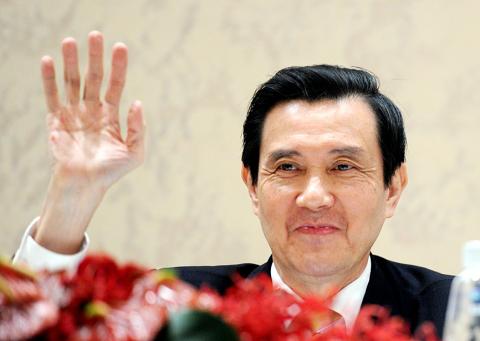President Ma Ying-jeou (馬英九) yesterday stressed that a cross-strait political negotiation is not a top priority for the government, as it would focus on more urgent issues such as the cross-strait service trade agreement.
In a meeting with the Taiwan Foreign Correspondents’ Club at the Presidential Office, Ma said Taiwan would not avoid cross-strait political issues, but the time is not right for political talks with China.
He reiterated his “economics first, politics later” policy for dealing with China and said for the two sides of the Taiwan Strait to engage in political talks and discuss the signing of a peace accord, his administration would have to seek a clear public consensus on the issue.

Photo: AFP
“We must be very cautious in addressing the issue of a cross-strait peace agreement. Many people in Taiwan still think that a peace agreement is aimed at unification and the government does not want to cause such a misunderstanding,” he said.
The signing of a cross-strait agreement on goods and the proposed establishment of cross-strait representative offices are more urgent issues, Ma said.
The two sides also agreed to prioritize efforts to facilitate the implementation of the cross-strait service trade agreement.
The agreement, signed in June during the ninth round of cross-strait talks, has yet to be approved by the Legislative Yuan.
Ma called for the Democratic Progressive Party (DPP) to support the agreement in the legislature, and said the agreement “must” and “will” be approved.
“The opposition camp can oppose the agreement, but should not hurt Taiwan to the core,” he said.
If the pact is not approved, the nation’s efforts to sign free-trade agreements with other nations would be compromised, he said.

SECURITY: As China is ‘reshaping’ Hong Kong’s population, Taiwan must raise the eligibility threshold for applications from Hong Kongers, Chiu Chui-cheng said When Hong Kong and Macau citizens apply for residency in Taiwan, it would be under a new category that includes a “national security observation period,” Mainland Affairs Council (MAC) Minister Chiu Chui-cheng (邱垂正) said yesterday. President William Lai (賴清德) on March 13 announced 17 strategies to counter China’s aggression toward Taiwan, including incorporating national security considerations into the review process for residency applications from Hong Kong and Macau citizens. The situation in Hong Kong is constantly changing, Chiu said to media yesterday on the sidelines of the Taipei Technology Run hosted by the Taipei Neihu Technology Park Development Association. With

CARROT AND STICK: While unrelenting in its military threats, China attracted nearly 40,000 Taiwanese to over 400 business events last year Nearly 40,000 Taiwanese last year joined industry events in China, such as conferences and trade fairs, supported by the Chinese government, a study showed yesterday, as Beijing ramps up a charm offensive toward Taipei alongside military pressure. China has long taken a carrot-and-stick approach to Taiwan, threatening it with the prospect of military action while reaching out to those it believes are amenable to Beijing’s point of view. Taiwanese security officials are wary of what they see as Beijing’s influence campaigns to sway public opinion after Taipei and Beijing gradually resumed travel links halted by the COVID-19 pandemic, but the scale of

A US Marine Corps regiment equipped with Naval Strike Missiles (NSM) is set to participate in the upcoming Balikatan 25 exercise in the Luzon Strait, marking the system’s first-ever deployment in the Philippines. US and Philippine officials have separately confirmed that the Navy Marine Expeditionary Ship Interdiction System (NMESIS) — the mobile launch platform for the Naval Strike Missile — would take part in the joint exercise. The missiles are being deployed to “a strategic first island chain chokepoint” in the waters between Taiwan proper and the Philippines, US-based Naval News reported. “The Luzon Strait and Bashi Channel represent a critical access

Pope Francis is be laid to rest on Saturday after lying in state for three days in St Peter’s Basilica, where the faithful are expected to flock to pay their respects to history’s first Latin American pontiff. The cardinals met yesterday in the Vatican’s synod hall to chart the next steps before a conclave begins to choose Francis’ successor, as condolences poured in from around the world. According to current norms, the conclave must begin between May 5 and 10. The cardinals set the funeral for Saturday at 10am in St Peter’s Square, to be celebrated by the dean of the College